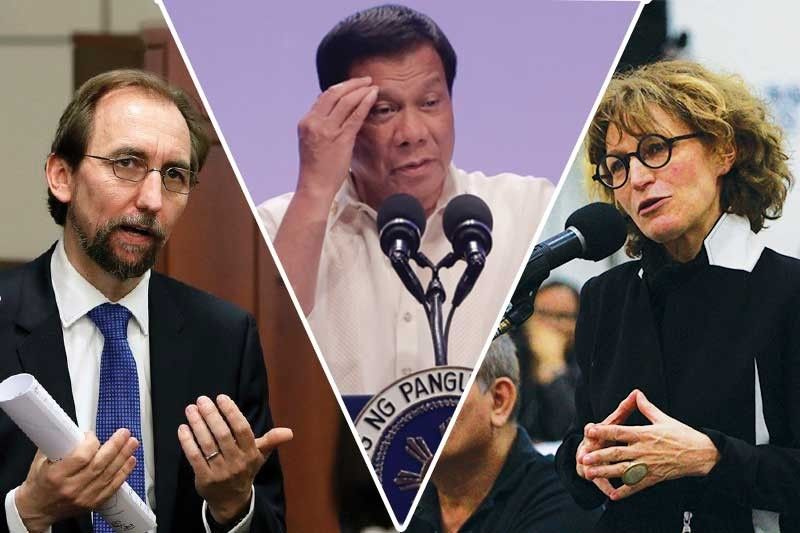Duterte cites international bias against him in pulling out of ICC

MANILA, Philippines — President Rodrigo Duterte cited on Wednesday the bias of some United Nations officials and the refusal of some in the international community as some of the reasons for his decision for Manila to withdraw from the Rome Statute, the international treaty that established the International Criminal Court.
Duterte has repeatedly lambasted UN special rapporteur for extrajudicial killings Agnes Callamard for supposedly being biased against him in her quest to probe into alleged extrajudicial killings.
Last week, United Nations High Commissioner on Human Rights Zeid Ra’ad al-Hussein blasted Duterte for the foul language he used against Callamard and other UN special rapporteurs, saying the Philippine leader might be in need of a psychiatric evaluation.
Duterte has also been roundly criticized by some countries and international groups for the brutality of his campaign against narcotics, which is believed to have left thousands dead in its wake.
These critical statements are some of the reasons Duterte cited in his decision to withdraw from the Rome Statute, which was adopted in 1998.
READ: Duterte announces Philippines' withdrawal from ICC l Fact check: Does the ICC have jurisdiction over Duterte?
“The actuations and statement of UN special rapporteur Agnes Callamard and UN High Commissioner on Human Rights Zeid Ra’ad al-Hussein readily show international bias and refusal of some sectors of the international community to support the Philippines’ legitimate efforts at self-determination, nation building and independence from foreign influence and control,” the president said in a statement, which is yet to be signed by Duterte.
He also cited that “implication of culpability” that the preliminary examination initiated by ICC prosecutor Fatou Besouda “unduly and maliciously” created in early February.
This is in contrast to the Palace reaction at that time, when Duterte’s spokesman was quick to point out that the preliminary examination announced by Besouda was not the same as an investigation and was yet to determine jurisdiction.
The Philippine leader also accused the ICC of being used as a “political tool,” echoing the position of his foreign secretary, Alan Cayetano.
He said that the ICC had shown a “propensity” for failing to due respect to states that signed the Rome Statute which led to his decision to withdraw.
“Given the baseless, unprecedented and outrageous attacks on my person as well as against my administration, engineered by officials of the United Nations as well as an attempt by the International Criminal Court special prosecutor to place my person within the jurisdiction of the International Criminal Court...I therefore declare and forthwith give notice, as president of the Republic of the Philippines, that the Philippines is withdrawing its ratification of the Rome Statute effective immediately,” Duterte said.
Duterte also said that the Rome Statute was not effective and enforceable in the country due to the failure to publish it in the Official Gazette or in a newspaper of general circulation.
He added that the effectivity of withdrawal was immediate and would not wait one year upon receipt of notification to be valid because of the “fraud” in entering the agreement.
“(T)he very considerations upon which the Philippines agreed to be signatory to the Rome Statute have not been observed or complied with,” the president said.
Duterte’s withdrawal came days after he expressed confidence that the ICC would “never, never, never” acquire jurisdiction over him.
Duterte’s complaint of bias against him also flies in the face of his own critical, and oftentimes, crude statements against world leaders, including former President Barack Obama.
- Latest
- Trending




























